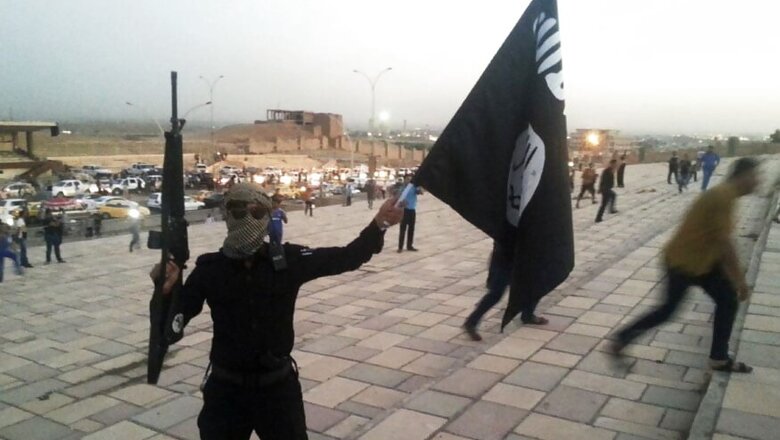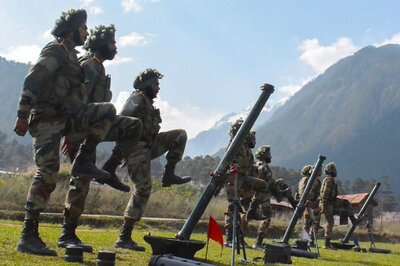
views
Al-Obeidi, Iraq: In the unforgiving deserts of Iraq, there is just one way to deal with defeated members of the Islamic State group who try to come home -- tribal justice.
No pardons are possible among tribes which have agreed among themselves to treat with the utmost severity those members who became jihadists.
As for the families of IS members, many have already fled, fearing reprisals.
The former army commander for operations in the western province of Anbar, where IS once held sway after a sweeping offensive across Syria and Iraq in 2014, told AFP returning jihadists face short shrift.
"The Bumahal and the other tribes have agreed to adopt a common stance" on the issue, said General Ismail Mehlawi, himself a Bumahal.
In the vast Sunni region where tribal law prevails, the tribes have addressed the thorny question of what to do about any relatives who pledged allegiance to the self-proclaimed IS "caliphate".
"They've all fled to neighbouring Syria," say residents of Al-Obeidi village in the heart of what was the last jihadist bastion in Iraq, which has just been retaken by Iraqi forces.
But if any return or are discovered in the area, they "will be treated with severity", Mehlawi said.
"No pardon will be possible," said the moustachioed Iraqi whose home was dynamited by members of his own tribe who had joined IS.
"We will punish them as prescribed by God so justice is done to the tribesmen who have been wronged" during the jihadist occupation.
The cycle of revenge has already begun in Al-Obeidi, said a security official in the Al-Qaim region whose 150,000 inhabitants belong to around half a dozen tribes.
Acts of vengeance -
"A week ago, Busharji fighters blew up the house of a member of their tribe who had joined IS" and who was himself accused of blowing up homes in Al-Obeidi, the official said, speaking on condition of anonymity.
Before destroying his home, the tribe shunned him, leaving the former IS man unprotected in a country where tribal law often takes precedence over the law and the courts.
Mohammed al-Mohammedi heads the municipal council in Hit near the Anbar provincial capital of Ramadi.
He told AFP that several months ago, he was approached by families demanding "the expulsion of relatives of jihadists".
Despite the authorities being aware of what was happening, this has not prevented acts of vengeance from taking place.
"One jihadist's house was destroyed by explosives, another was burned down and stun grenades have been thrown at the homes of other families whose relatives joined IS," Mohammedi said.
The perpetrators of the attacks were never identified.
But afterwards, several families moved out in a scenario mirrored in other places including Iraq's second city Mosul which IS also occupied before it was retaken.
"The families of jihadists can't live here because it creates tensions," said Mohammedi.
Another senior tribal official in the Ramadi region, Sheikh Awad al-Dalma of the Budalma, has drawn up a list of more than 250 names.
These are of "267 terrorists from the Budalma, Bushaaban, Budhiab and Janabin tribes" he said were guilty of "murders or destruction of houses".
- History of anti-extremism -
As for the Bumahal tribe, Sheikh Mohammed Sattam said "just two members joined IS in 2014. One was killed and the other fled and is now being sought."
"We will keep fighting whoever joined IS," he added, wearing the military uniform of a tribal combattant.
Several Anbar province tribes boast of having a long history of battling jihadists.
When another extremist Sunni group, Al-Qaeda, staged bloody attacks in Iraq in the aftermath of the US-led invasion of Iraq in 2003, tribal fighters took up arms.
A number of their members also hold senior positions within the Iraqi armed forces.
When IS proclaimed its "caliphate" across Syria and Iraq in 2014, several Iraqi Sunnis -- in a country that is two thirds Shiite -- decided to pledge allegiance to the jihadist group.
But Bumahal fighters, along with members of other tribes, formed Sunni units within the Hashed al-Shaabi, a motley coalition of Shiite militias and local fighters determined to drive IS out of Iraq.
Such was the case with Faisal Rafie, Kalashnikov assault rifle in hand.
Behind him in a swirling sandstorm are piles of rubble -- what is left of houses the jihadists blew up in Al-Obeidi.
Today, those who lost their homes are demanding justice.
"The IS terrorists destroyed our houses and stole everything from us because we were fighting against injustice and terrorism," Rafie said.
"Everything we owned, we sacrificed everything for the people of Iraq."




















Comments
0 comment